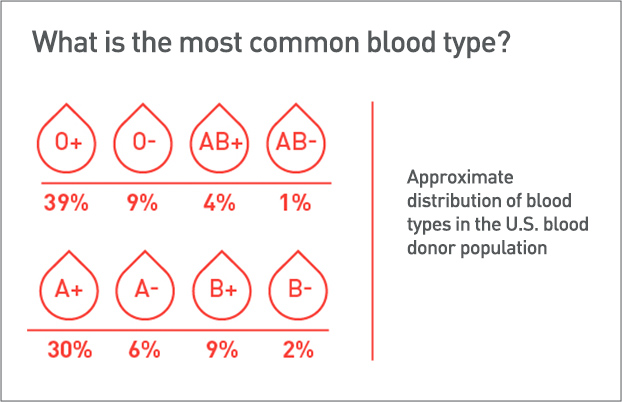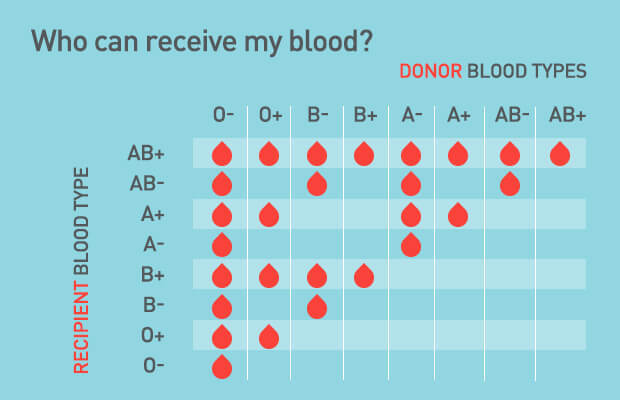Blood Types
Blood types are inherited and determine who you can give blood to and receive blood from. The type of blood donation that is best for you is determined by your blood type, as well as patient need.
What Determines Blood Type?
What makes blood types different? There are four major blood groups determined by the absence or presence of specific proteins called antigens, found on the surface of red blood cells and antibodies in the plasma. You’ve probably heard of people being Rh Positive or Negative as well. In addition to the A and B antigens, there is a protein called the Rh factor, which can be either present (+) or absent (–), creating the 8 most common blood types (O+, O-, A+, A-, B+, B-, AB+, AB-). Each blood type is unique and special. These types must be properly matched for a blood transfusion to work.
Don’t know your blood type? You can find out when you donate!
Blood Type Facts
Explore each blood type to learn more about its characteristics, including who can receive transfusions from this blood type and which type of blood donation is most impactful.

39% of the population
O+, AB+, A+, and B+ can receive O+ donations
Super Reds: most impactful donation

9% of the population
Universal blood type, all 8 blood types can receive O-
Used on helicopters for immediate use.

30% of the population
AB+ and A+ can receive A+ donations
Platelets: most impactful donation

6% of the population
AB+, AB-, A+, and A- can receive A- donations
Super Reds: most impactful donation

9% of the population
AB+ and B+ can receive B+ donations
Platelets: most impactful donation

2% of the population
AB+, AB-, B+, and B- can receive B- donations
Super Reds: most impactful donation

4% of the population
AB+ can receive AB+ donations
Plasma and Platelets: most impactful donation

1% of the population
AB+ and AB- can receive AB- donations
Plasma and Platelets: most impactful donation
Blood Type Rarity
The most common blood types are type O+ (39% if the U.S. population) and type A+ (30% of the population). But certain blood types are extremely rare!
- 1% of the population has AB- blood type
- 2% of the population has B- blood type.
- 6% of the population has A- blood type
- 9% of the population has O- blood type. The universal type that can be transfused for any need.


Blood Types and Transfusions
Antigens are proteins on the surface of your red blood cells. Antibodies are proteins in your plasma that your body makes after you’ve been exposed to a “foreign” antigen or other such item (such as a virus.)
As part of an immune response, the antibody will latch on to the foreign antigen and destroy the entire cell! This is why it’s important to recognize which antigens and antibodies are present in both the donor AND patient when planning a blood transfusion. The following chart shows which donor blood types can give blood to each recipient blood type.


